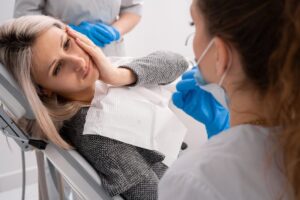
Dental emergencies can strike when you least expect them—whether it’s a sudden toothache, a broken crown, or a knocked-out tooth during a weekend game. While accidents can’t always be prevented, many dental emergencies are avoidable with the right habits and precautions. By taking proactive steps, you can protect your teeth, gums, and smile from painful (and often costly) situations. Here are 5 must-know tips for avoiding a dental emergency.
1. Don’t Ignore Tooth Pain or Sensitivity
A small toothache might seem harmless at first, but it’s often an early warning sign of something bigger—like tooth decay, a cracked tooth, or infection. Ignoring pain can allow the issue to worsen, potentially leading to severe discomfort or even the need for emergency treatment.
If you experience lingering pain, sensitivity to hot or cold, or swelling around a tooth or gum area, contact your dentist right away. Early intervention can save your tooth and prevent more serious complications down the road. Remember: when it comes to dental pain, it’s always better to be safe than sorry.
2. Protect Your Teeth During Sports and Activities
Whether you play football, basketball, hockey, or even enjoy cycling, sports-related dental injuries are common—but they’re also preventable. A custom mouthguard made by your dentist offers the best protection against knocked-out teeth, broken enamel, and soft tissue injuries.
Even for non-contact sports, wearing a mouthguard can be a smart choice. If you grind your teeth while exercising or clench your jaw under pressure, it can prevent unnecessary wear and damage.
3. Practice Smart Eating Habits
What you eat—and how you eat it—plays a big role in your dental safety. Hard foods like ice, popcorn kernels, or hard candies can crack or chip your teeth. Sticky snacks, on the other hand, can loosen fillings or crowns and trap bacteria that cause decay.
To protect your smile, avoid chewing on non-food items (like pens or fingernails), and cut tough foods like apples or crusty bread into smaller bites. Being mindful of your eating habits can prevent sudden tooth fractures or lost restorations.
4. Maintain Regular Dental Checkups and Cleanings
Routine checkups are one of the easiest ways to prevent dental emergencies. During these visits, your dentist can detect problems early—such as small cavities, weakened enamel, or gum inflammation—before they turn into painful issues.
Professional cleanings also help remove plaque and tartar buildup that brushing alone can’t reach, reducing your risk of decay and infection. Most dentists recommend visiting every six months, but your schedule may vary based on your oral health needs.
5. Be Prepared with a Dental Emergency Kit
Even with the best prevention, accidents can happen. Having a small dental emergency kit on hand can make a big difference in how you handle unexpected issues. Your kit should include:
- Gauze and a small container with a lid (for a knocked-out tooth).
- Dental wax (for sharp edges or broken braces).
- Pain relievers.
- Salt packets for rinsing.
- Your dentist’s contact information.
Quick action can often save a tooth or prevent further damage while you get professional care.
Avoiding a dental emergency comes down to awareness and prevention. By protecting your teeth, maintaining good oral hygiene, and addressing small issues early, you can dramatically reduce your risk of pain or injury.
About the Practice
Have you found yourself in a dental emergency situation? Don’t hesitate to call our expert team at Schumacher Dental. We have same-day emergency appointments available and can get you scheduled in the evening and on weekends for your convenience. We even welcome walk-ins! After all, prompt care is one of the priorities we operate on, especially when it comes to an urgent visit. Go ahead – schedule your appointment online now or call (781) 334-3400.
